
Related
Guests
- David Leighinvestigations editor at The Guardian. Click here for full Guardian coverage of the Afghanistan war logs.
We speak with David Leigh, the investigations editor at The Guardian, one of the three newspapers, along with the New York Times and Der Spiegel, WikiLeaks gave the Afghanistan war documents to. “Broadly, we see a similar picture in the three media. What we do see is quite a different political perspective. From the New York Times’s point of view…it was interesting to see that the relationship with Pakistan was a political priority,” Leigh says. “With us, we’re more concerned about the casualties, I think. We’re troubled more, a European audience, by the toll this war is taking on innocent people.” [includes rush transcript]
Transcript
AMY GOODMAN: We’re joined right now — for more on this explosive WikiLeaks story, the largest release of government documents in US history, we go to London, and we’re joined by Democracy Now! video stream by David Leigh, the investigations editor at The Guardian newspaper of London. He wrote a number of the articles on the Afghanistan war logs. The Guardian was one of three newspapers that WikiLeaks gave the documents to, on the understanding that they would be published simultaneously: The Guardian of London, Der Spiegel in Germany and the New York Times here in the United States.
David Leigh, welcome to Democracy Now!
DAVID LEIGH: Hello.
AMY GOODMAN: It’s good to have you with us. First, explain how you got a hold of the documents. When did WikiLeaks first approach you?
DAVID LEIGH: WikiLeaks didn’t approach us; we approached them. We heard from all the publicity that Julian Assange of WikiLeaks, who I knew a little bit about, had got hold of a lot of rather explosive material. And so, my colleague, Nick Davies, went and tracked him down in Brussels, buttonholed him in a cafe in Brussels and spent six hours persuading him that he should let us see the material in advance to dumping the whole lot on the internet. In the end, it was agreed that us and the New York Times and Spiegel would all have the material under embargo, be able to analyze it, and put it out simultaneously.
AMY GOODMAN: Talk about the significance of these documents. What did you think? What were you most surprised by? What do you think is its greatest — their greatest importance?
DAVID LEIGH: Their greatest importance is their unvarnished quality. Everything that’s come out about this war has been filtered or spun. You know, it’s been a very difficult war to report. It’s been very chaotic. Many of the things that go on have gone on in remote districts, that nobody has been covering the stuff. What reports come out are filtered, are garbled, are sanitized. So, to see unsanitized snapshot reporting, day by day, and sometimes indeed hour by hour, gives you the genuine flavor of what has occurred on the ground, and that’s really important, because that’s what the war is actually like.
AMY GOODMAN: Tell us the story of one man who you wrote about, one man who was deaf and mute and who was killed.
DAVID LEIGH: Yes, Shum Khan. This is one of the rather harrowing little stories that appears in these 92,000 entries. He lived in a very remote village 7,000 feet up in the mountains near the border with Pakistan. A CIA paramilitary squad charged into the village. They were on some secret mission, I suppose. And he was frightened, and he started to run away. They shouted at him to stop. He didn’t stop, because he couldn’t hear them. But they didn’t know that, so they shot him. And then, afterwards, the village elders explained the mistake to them, so they fetched out some supplies — I don’t know exactly what they were, probably rice and beans, that kind of thing — and handed them over as compensation, what they call “solatia.” And then the CIA paramilitary team carried on its way to whatever military mission it was doing. And that’s a little story of an interaction between an ordinary disabled person and, you know, a killer squad, probably.
AMY GOODMAN: And talk about how you feel that is emblematic of the stories you have read about or particularly the issue of civilian casualties in the Afghan war.
DAVID LEIGH: The civilian casualties and the stories of them are the things that got to me most, actually. I had heard a lot about the air strikes. There’s been so much controversy about air strikes in which dozens or scores of civilians are alleged to have been killed, and then President Karzai has bitterly protested in public in the past about that. But what got to me and what I had not seen reported properly before was incident after incident, day after day, in which troopers in patrols or on convoys just shot drivers or motorcyclists or passersby, because they were frightened that they might be suicide bombers. And so, if they didn’t give way to a convoy or they got too close, they just blasted them with machine guns. And then, of course, it would turn out they weren’t bombers at all. They were sometimes just children. They were passengers in cars, that kind of thing.
AMY GOODMAN: We’re talking to David Leigh, who’s the investigations editor at The Guardian. We’re speaking to him in the Guardian newsroom, so you hear people in the background. He wrote a number of the articles on the Afghanistan war logs. Can you explain, David, the process that the three newspapers and WikiLeaks went through in dealing with the US government before these documents were released?
DAVID LEIGH: I’ll tell you exactly how it worked, as far as we know from our end. The three newspapers got together and agreed that we were going to publish simultaneously. The New York Times said, “We have to go to the White House in advance, as a responsible American media organization, and tell them about this and give them the opportunity to say what they have to say.” And we agreed that they could do that. And they did last — I think the Friday before we all published on the Sunday night, or maybe the Thursday. They went to White House. They told them all about it, and they took account of their responses. Seems to me that one of the things in the White House people’s minds was about the danger to informants or troops, and they asked, apparently, what we’d already decided to do, which was to take out names of anybody who might be a local informant or collaborator who could suffer reprisals. We had already decided to do that, and we all did that.
AMY GOODMAN: Actually, it’s interesting, because the White House praised the New York Times in how careful they were. And although Robert Gibbs, you know, attacked the release, talking about the potential danger, it was actually, though repeated in a different way, a pretty — he was careful about how he said it. He didn’t just say this is about the danger of exposing people on the ground. He talked about the potential danger, because they had worked with the New York Times in releasing these.
DAVID LEIGH: Well, I’ll say it again: we had already decided, on Spiegel, on the New York Times and on The Guardian, what we were going to do, and we were going to take out names that we thought might be in danger of reprisals. And we decided not to publish certain intelligence reports that describe that kind of thing. So all those decisions had been taken. So the White House was pushing at an open door when it said, “We don’t want people to be in danger.” So they’re not — they’re congratulating us for something we had already decided to do.
AMY GOODMAN: Has Julian Assange withheld some number of the documents to do exactly that, as well, redact them or protect sources?
DAVID LEIGH: Yes, as I understand it, that is the reason. He, too, agreed that it will be a good thing to redact anything that might endanger sources. And because he planned to publish the entire database, not just selected data that had been studied in advance, like us, he’s had to hold back 15,000, he says, for review to see what the problems might be.
AMY GOODMAN: So, David Leigh, exactly how many documents did you release?
DAVID LEIGH: About 300 we released in full, and they were ones that we personally liked better.
AMY GOODMAN: How many pages was that?
DAVID LEIGH: Well, it’s 300 pages, 300 files. Each file is a page. There’s 92,201 in all.
AMY GOODMAN: I want to go back to White House Press Secretary Robert Gibbs. This is another excerpt from his press briefing on Monday.
REPORTER: And what efforts — I know that you’ve met with the Times.
PRESS SECRETARY ROBERT GIBBS: Yeah.
REPORTER: What efforts did to make to try to get in touch with Assange or any of the WikiLeak people?
PRESS SECRETARY ROBERT GIBBS: They are not in touch with us. The only — the only effort that I made in discussing — the only effort that I made with the Times, who, I will say, came to us, I think handled this story in a responsible way, I passed a message through the writers at the New York Times to the head of WikiLeaks to redact information that could harm personnel or threaten operations or security. And I think that’s in their story, in the Times story today.
REPORTER: Robert, did you —-
PRESS SECRETARY ROBERT GIBBS: Nice try, though.
REPORTER: Did you try to get the New York Times not to publish?
PRESS SECRETARY ROBERT GIBBS: No, never asked them that. The New York -— let’s keep in — let’s understand first a few things. The New York Times didn’t publish the documents. WikiLeaks published — WikiLeaks published the documents.
I will say this: had only the New York Times
had this story, would we have made a case and an effort, as we have with them and other news organizations, not to compromise security? Yes. But understand that the Times was one — the New York Times was one of three news organizations that had access to these documents. We got questions from — I believe on Friday from Der Spiegel and met with — Tommy Vietor, Ben Rhodes and I met with the New York Times on Thursday.
AMY GOODMAN: David Leigh, would you care to comment on what Robert Gibbs, the White House press secretary, said?
DAVID LEIGH: Well, that’s pretty well confirmed by my understanding of the situation. I’ll just repeat once again that he was pushing at an open door, because we had already independently taken those decisions. We weren’t going to publish anything which endangered individuals or genuinely compromised security. We knew most of the material was historic anyway. It was about operations that had already happened, so there wasn’t any tactical sensitivity to it.
AMY GOODMAN: David, I’m going to interrupt just because we’re having trouble now with the feed. We’re going to delink, and we’re going to come back to you. David Leigh is the investigations editor at The Guardian. We’re going to go to a short break. He has written a number of the articles on the Afghanistan war logs. We’re joining him by Democracy Now! video stream at the news room in The Guardian. Let’s go to a quick music break.
[break]
AMY GOODMAN: David Leigh, our guest, investigations editor at The Guardian. We’re joining him in the Guardian newsroom at London. He wrote a number of the articles on the Afghanistan war, because The Guardian, one of the three newspapers that released the documents simultaneously that WikiLeaks had, wikileaks.org.
Talk about the coalition forces having long claimed that Afghan insurgents could not obtain the technology required to shoot down planes. I’m reading actually a headline from one of your articles, David.
DAVID LEIGH: It was a surprising discovery that, in fact, when a Chinook helicopter was shot down and when the coalition claimed at the time that it was an RPG, a grenade launcher, the evidence that the pilot supplied, and which appears in the logs, is that they were pretty convinced it was a MANPAD, as they call it, a shoulder-launched surface-to-air missile, because that is the big thing that scares the coalition forces. If they get surface-to-air missiles, if they get Stingers, indeed, which the Americans supplied originally to the mujahideen, then the game is probably up in Afghanistan, because the allies won’t any longer have total air superiority.
AMY GOODMAN: How has this been received in Britain? I mean, it’s interesting to look at the effect of these documents in the different countries where the news of this has been played very big.
DAVID LEIGH: It’s playing as a very, very big story. And the reason for that is because there’s growing disaffection in Britain with the Afghan war. And the fact that the kaleidoscope of intermittent reports, which is all that’s been coming in, with a sort of roll call of a British soldier dying every day nearly, against that backdrop, to have this enormous quality of material suddenly appear and which confirms people’s worst suspicions about the chaotic and futile nature of the war often and its cruelty and bloodiness to civilians, that seems to have touched a button in the public here, because it’s crystallized to people that we don’t like this war. It’s a mess. Why are we here? It’s all gone wrong.
AMY GOODMAN: I wanted to read you from the Columbia Journalism Review. The Columbia Journalism Review, “Same Docs, Different Stories: The Three Outlets Gifted by WikiLeaks Take Three Different Approaches.” “On Sunday, three news outlets published the results of their investigations into [the more than 91,000] classified U.S. military documents…New York Times, The Guardian, and Der Spiegel each led…with their findings on their front pages…
“Mostly, the papers highlight the same discoveries: high incidents of weapons failure among U.S. drones; the actions of task force 373, the secret commando unit tasked with capturing or killing top insurgent leaders; the Taliban’s possession and use of heat-seeking missiles; the hitherto suspected and assumed, but difficult to demonstrate, involvement of Pakistan’s Inter-Services Intelligence (ISI) in, and instigation of, Taliban operations against the coalition; and revelations of higher numbers of civilian casualties than previously acknowledged.
“But in shaping their syntheses of these various findings, each paper manages to characterize the discoveries in different ways, mostly to emphasize their relevance to local concerns about the war. The two European papers, both historically against the war, find in the reports cause for great pessimism.”
Your response to this, David Leigh of The Guardian?
DAVID LEIGH: My first response is that this is the virtue of the free press, that you’ve got three media organizations in three different countries and they come to three rather different perspectives about the whole thing, because we all compiled our reports independently. You know, I mean, we all had the same data, and we all did our work on it and came to different conclusions — well, slightly different conclusions.
I think we all agreed that — about the things that mattered. The things that mattered in this quantity of material were the strained relationship with Pakistan and the ISI. A thing that mattered was civilian casualties. A thing that ought to be brought out in detail is the activities of the Task Force 373, the so-called assassination squad. So, broadly, we see a similar picture in the three media.
What we do see is quite a different political perspective. From the New York Times's point of view, addressing their own American audience, it was interesting to see that the relationship with Pakistan was a political priority and that the way all the aid money is being poured from the American taxpayer into Pakistan, who appears to be perhaps playing a double game. That seems to be a big button at the presses in America. With us, we're more concerned about the casualties, I think. We’re troubled more, a European audience, by the toll this war is taking on innocent people. And I think — remember that the British and the Germans have been sort of cajoled into sending troops to this war. In Britain, we didn’t send them until 2006. And we know there has been American pressure for us to send more, to help more. We think we’ve been sucked into something which doesn’t make a lot of sense. So that’s why I think there’s a difference in perspective.
AMY GOODMAN: And this issue of more concern for casualties, civilian casualties, in Britain than in the United States? Why do you think that is?
DAVID LEIGH: Well, in Britain and in Germany. In Germany, for example, there was a huge scandal when — the Kunduz incident last year — some fuel tankers that had been hijacked by the Taliban, a German commander ordered an air strike, which blew up the tankers and ended up killing a whole lot of civilians. That caused a huge political scandal in Germany, and it led to political resignations. And some of the other things that come out in these documents approach the quality of war crimes. There was a Polish battle group that mortared a village and a wedding party, and it seems to have been a revenge attack. And indeed, the Poles attempted to put the soldiers on trial for it, although I don’t know what’s become of the trial. It sort of [inaudible].
Are we more sensitive in Europe to the idea of civilian casualties? I don’t know. The New York Times said, I think, “We know all that. We’ve reported very extensively on that already.” And they seem to feel that they’ve said and done enough about it. In Britain, I think we felt we haven’t said enough about it. We’ve concentrated so much on the deaths and woundings of the British troops, but we haven’t had a lot of information to put out about the effect on innocent civilians.
AMY GOODMAN: David Leigh, I want to thank you very much for being with us, investigations editor at The Guardian of London, speaking to us from The Guardian newspaper, one of the three newspapers that released these documents together on Sunday — New York Times, Guardian of London and Der Spiegel in Germany. Thanks so much.

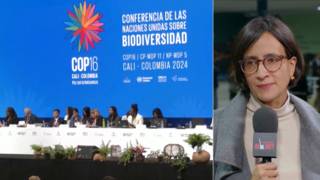
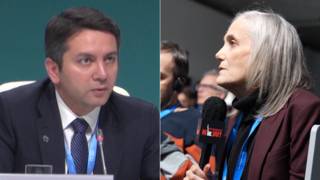

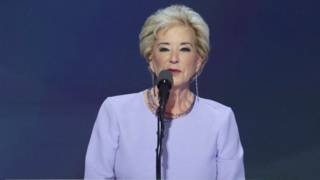





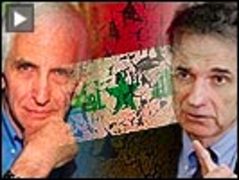
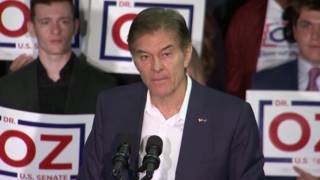
Media Options